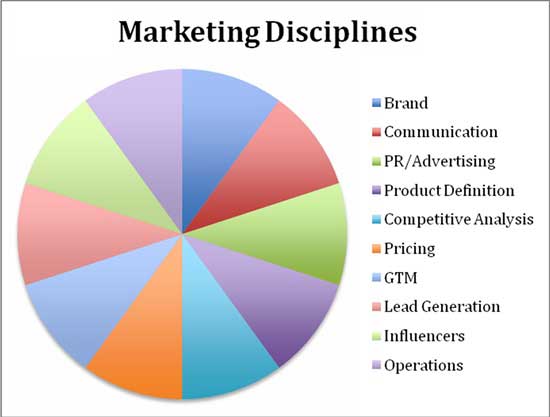I recall, years ago at IBM, attending a mentoring session with the CMO. She started her one-hour presentation explaining that marketing had many disciplines. It was early in my marketing career, and I remember being so excited to listen to her teach a topic she knew so well.
She started by drawing a big circle upon which she created spokes, like a wheel. And each spoke had a different topic assigned. She then explained all the spokes and how they fit together to create a strong and effective marketing team.
The topics she spoke about are still form the platform upon which great marketing organizations are built, and they help great companies become leaders in the market they choose to serve.
What I remember so well about that day: There is a lot more to marketing than meets the eye.
And a for the first time I thought that perhaps marketing is the best discipline for understanding all the moving parts of a company and for determining a company's success or failure—and that it's great experience for a future CEO.
The Constituent Disciplines of Marketing
The spokes looked something like this:

And the spokes can be described as follows:
Brand strategy: creating the voice and the values of the company and what it sells.
Communications: ensuring that the message is appropriately created and delivered both inside and outside the company—including public relations and advertising.
Product definition: understanding market wants and needs, and translating them into concise requirements that can be transformed into what is sold.
Competitive analysis: knowing the competition from all aspects—the product, price, how they sell and market, their successes/failures, and what customers are saying.
Pricing: determining how much the market will pay—not only in the local market but also around the world, and also depending on the specific customer.
Go-to-market (GTM): determining the addressable market, the segmentation, the sales coverage, the revenue splits, the marketing spend, the business case.
Awareness and lead generation: defining and executing tactics that will create real excitement and demand for what you sell, including all things Web, social, and physical and virtual events.
Influencer relations: developing and maintain a good relationship and reputation with analysts, bloggers, and journalists.
Operations: yes there are real metrics and measurements that define success and serve as yard sticks to hold people accountable.
That session at IBM has stuck with me through the last 25 years. That day, I took away that marketing is perhaps the most important organization within any company. And today, with the continuation of technology shifts, power shifts, and market dynamics, I am convinced that great CMOs are destined to be the next CEOs.
Career Advice: How to Be a Great Marketer
So, with that as a backdrop, think about the key disciplines that you need to prepare yourself for to become a great marketer.
The following is the career advice that I would have given my 25-year-old self. (Indeed, I have a daughter in her twenties who is a marketer, and we spend a lot of time together talking about the approaches she should consider to solve problems and the skills she needs to be most effective.)
Passion for your job trumps all else. Passion is infectious. I've always been curious about those who mope around complaining about their jobs. If you don't love what you are doing, find something that you do love—and pursue it with passion!
Deep knowledge is crucial. You'll never be the best if you never hone your craft beyond a surface understanding of your field. Learn all you can from all the sources you can muster. So many resources are at your fingertips today. Find them, and use them.
Confidence, tempered with humility, will help you advance. While you are exploiting all those resources and becoming a master in your field, remember that no one likes a know-it-all.
Learn to write well. So many young professionals struggle putting cogent sentences together. You must be able to articulate your point of view via the written word, and you must learn to tell stories. Don't be boring. Resist the urge to follow conventional wisdom. Rise above the crowd—be compelling, be bold! Write what you would enjoy reading.
Learn to sell—not only your product but also yourself and your ideas.
Ask for help. All the great leaders I've met have never been shy to admit what they don't know, and they seek knowledge from many places—peers, subordinates, superiors, customers... Don't be timid; ask for what you need to succeed.
Find a mentor—or two. You need someone you can trust, someone you can say anything to, someone who will listen to you without causing you to shut down—and who will also guide and encourage.
Build your allies—your peer group, your direct reports, your boss, the executive team, your network. Aligning with only one or a few will only get you so far; use a "be pushed and be pulled" career-growth strategy.
Take criticism with grace and elegance. Assimilate it. Learn from it.
Understand the math. There is science in being a good marketer. Make sure the numbers make sense; understand how the math ties to the P+L, the revenue, the marketing KPIs.
Stay ahead of technology. It is changing all the time, so stay current; don't allow yourself to become obsolete.
Meet with customers. Nothing is more effective—and often sobering—than listening to what the person who is paying your salary has to say about your company.
Cliches matter. You really do need to work hard to get ahead. Don't believe advice to the contrary.
Become the expert in your specific discipline—and move on. Don't get too comfortable being the resident expert. It is fun being the "go to" person, but not at the risk of stagnating. The great marketers have a deep understanding of all the spokes.
Step out of marketing for a while and learn another part of the business. We learn best by doing. Consider carrying a quota, or a turn in product management, or finance. Diversity gives you better perspective of how the business works. And you will gain a sincere appreciation for what others are doing to contribute to the end goal, making you ultimately a more effective marketer.
* * *
I've carried that day 25 years ago with me for a long and rewarding career. I was fortunate to be in a large company like IBM, rich in resources and fanatic about teaching and training its employees. And though we may not all have the resources of IBM in reach, we have a terrific opportunity to lead the way, demonstrating just how powerfully instrumental our roles can be.
The future is yours to create: Seize the opportunity to learn and continue to position marketing as a great career choice—a choice that not only leads to potentially becoming a CMO but also provides a great experience base for the next generation of CEOs.




